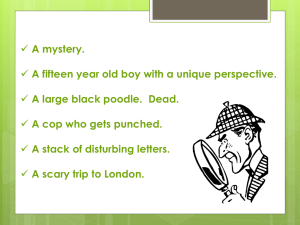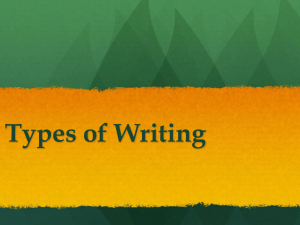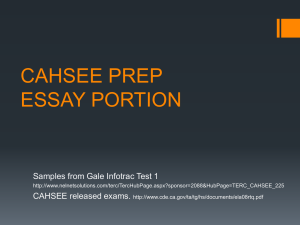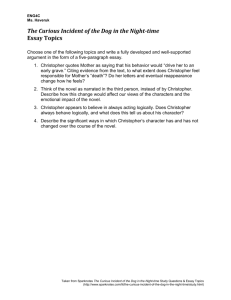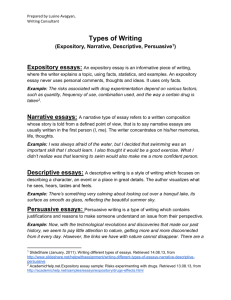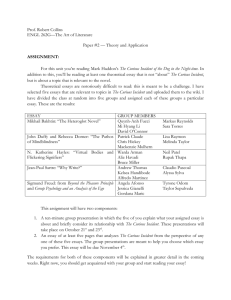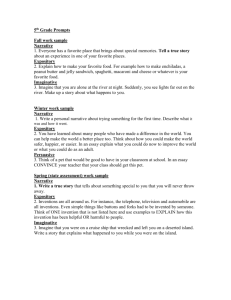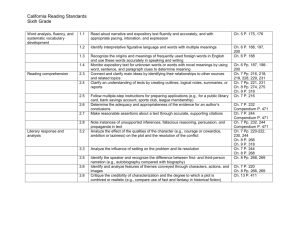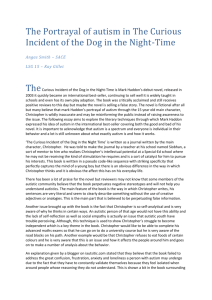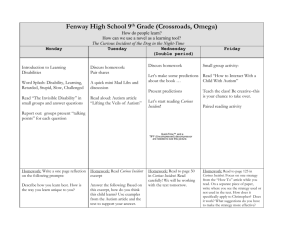Narsuasitory Essay - Lionsgate Academy
advertisement
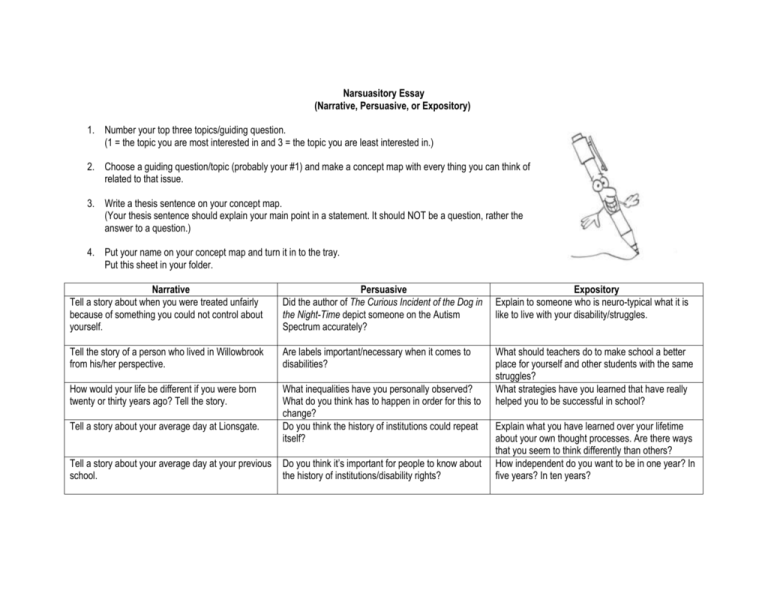
Narsuasitory Essay (Narrative, Persuasive, or Expository) 1. Number your top three topics/guiding question. (1 = the topic you are most interested in and 3 = the topic you are least interested in.) 2. Choose a guiding question/topic (probably your #1) and make a concept map with every thing you can think of related to that issue. 3. Write a thesis sentence on your concept map. (Your thesis sentence should explain your main point in a statement. It should NOT be a question, rather the answer to a question.) 4. Put your name on your concept map and turn it in to the tray. Put this sheet in your folder. Narrative Tell a story about when you were treated unfairly because of something you could not control about yourself. Persuasive Did the author of The Curious Incident of the Dog in the Night-Time depict someone on the Autism Spectrum accurately? Expository Explain to someone who is neuro-typical what it is like to live with your disability/struggles. Tell the story of a person who lived in Willowbrook from his/her perspective. Are labels important/necessary when it comes to disabilities? How would your life be different if you were born twenty or thirty years ago? Tell the story. What inequalities have you personally observed? What do you think has to happen in order for this to change? Do you think the history of institutions could repeat itself? What should teachers do to make school a better place for yourself and other students with the same struggles? What strategies have you learned that have really helped you to be successful in school? Tell a story about your average day at Lionsgate. Tell a story about your average day at your previous school. Do you think it’s important for people to know about the history of institutions/disability rights? Explain what you have learned over your lifetime about your own thought processes. Are there ways that you seem to think differently than others? How independent do you want to be in one year? In five years? In ten years? Narrative Write what happens to Christopher after The Curious Incident of the Dog in the Night-Time ends. Tell part of The Curious Incident of the Dog in the Night-Time from another character’s perspective. Persuasive Do you think Judy Boone made the right decision to leave Christopher and his father? Is High-Functioning Autism or Aspergers a disability or just a “different way of thinking”? Tell a story about how your life would change if you had one magical power. Tell a story about an adult who didn’t really understand you. Do stereotypes represent truth? Tell a story about someone who made a difference in your life. Write about a time you faced a challenge. How did you deal with it? What was the outcome? What jobs might Christopher be especially suited for when he gets older. Why would he be so good at them? A television network is looking to produce a new television show for teenagers. Write an essay describing your show and convince him/her how it will attract a large audience. Should students be required to pass proficiency tests in order to graduate from high school? Expository In what ways did you identify with Christopher from The Curious Incident of the Dog in the Night-Time? In what ways did you find Christopher from The Curious Incident of the Dog in the Night-Time difficult to relate to? Describe what places or activities help you feel comfortable and relaxed. Explain a difficult decision you’ve had to make. How did you make your decision? Explain your reasoning. Compare and contrast the merits of Mac and PCs. Describe the many talents of Chuck Norris. Essay Guidelines For full credit your essay must: Have at least five paragraphs of 3-4 sentences each (unless an exception is approved by a teacher). Be organized in a way that is logical for your type of essay. (See your notes.) Persuasive and Expository essays must have a thesis statement at the end of the first paragraph. (Narrative essays are an exception.) Persuasive and Expository essays must have a topic sentence at the beginning of each paragraph. (Narrative essays are an exception.) Have no more than five incomplete or run-on sentences. Have distinct paragraphs with transitions. Remember that I grade credit/no-credit-until-you-make-changes. Our goal is to take you from wherever you are and help you to make your writing better. The harder you work now and the more feedback you get up front, the less likely you are to have to make major changes in the future.
